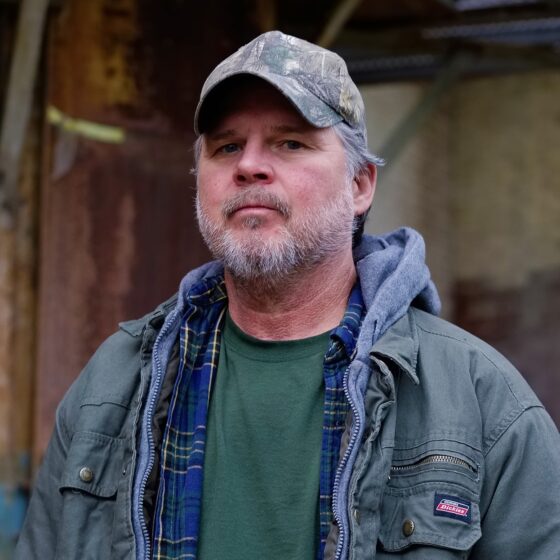Almost Daylight is very much a Chris Knight album, familiarly featuring vivid pictures of rural characters, desperate men and hardscrabble survivors. At the same time it’s unlike anything Knight has done before, with formidable testaments to compassion, redemption and even straight-up love. It’s an album both tough and tender, as bare-knuckled as it is open-hearted. “I do think there’s a cohesiveness to this album,” Knight explains in his thick Kentucky rasp. “The title is key, I suppose. Through all these songs, you could find a theme about seeking shelter.”
Produced, mixed and mastered by Grammy-winner Ray Kennedy – best-known for his 30+ year creative partnership with Steve Earle as well as producing Chris’ Enough Rope (2006), Trailer II (2009) and Little Victories (2012) albums – Almost Daylight also sounds like no other Knight record, with scorching guitars by Georgia Satellites founder and two-time Knight album producer Dan Baird, rich background vocals by Chris Clark, Siobhan Kennedy and Lee Ann Womack, and deeper instrumentation than ever before. “Chris had been playing some of these songs on the road and started developing ideas before we got to the studio,” Kennedy says. “He and I talked about keeping the Appalachian factor with banjo, fiddle, harmonica and mandolin where it felt right. It was significant that Dan was involved, as he’s the man who can play guitar with the right feeling for Chris. The background vocals really brought the fire, and this lead to ideas for piano, Hammond B-3, accordion and Wurlitzer electric piano. Everything evolved from the performance of each song and I let the songs dictate what they needed in order to evolve into an album.”
“I was determined not to do any acoustic songs on this album,” Chris explains. “I wanted it all to sound edgy and raw, but to feel big at the same time. We kept trying different approaches until I felt we landed on what worked. The thing is, some of my songs might take a year of writing before I even think they’re ready for recording and I fretted about every one of these. I’ve never put a cover song on any of my records before, but there are two covers on this one. And I think it all fits together pretty good.”
The album opens with “I’m William Callahan”, a defiant roar fueled by equal parts pride, memories and searing guitar. “Crooked Mile” is classic Knight, a piercing take on outsiders bound by love, while the poignant “Send It On Down” is a plaintive plea for salvation. There are tales of small-town despair (“I Won’t Look Back”), ominous rural menace (“Trouble Up Ahead”) and melancholic break-ups (“Everybody’s Lonely Now”). Chris’ cover of Johnny Cash’s “Flesh And Blood” – which originally appeared on the Dualtone 2002 tribute album Dressed In Black – is a poignant interpretation of Cash’s ode to devotion. The plainspoken positivity of “Go On” is one of Knight’s most life-affirming songs, while “The Damn Truth” is a ferociously clear-eyed look at our current cultural divide. The title track might be the most unexpected Knight song of all, an unapologetic paean to the power of love. “That’s probably my favorite song on the album,” Chris says, “because it’s closest to the truth.” He then quickly adds with a laugh, “I’m killin’ people with love now.” The album closes with yet another surprise; a joyfully raucous duet between Knight and longtime fan John Prine on Prine’s 1973 classic “Mexican Home”. “I love that song, but it took me 15 years to find a way to do it,” Knight says. “I kept playing around, changing the vocal key and finally landed on the spot. I’ve been singing it my kitchen table for the last few years, and when we were down to the last song, I knew this should be it.”
With the release of Almost Daylight, this native son of Slaughters, Kentucky (population 238) is eager to get back on the road and perform these songs for the faithful. Meanwhile, the singer/songwriter who was originally inspired by the likes of Prine and Earle now finds himself influencing a new generation of artists who revere Knight’s idiosyncratic talent and attitude. “There’s all kinds of different ways to make music, but this is the way I chose to do it,” Chris says. “If I don’t have something worth saying I’m not opening my mouth, which is probably why I took seven years to make this album.” And for an artist who has always defied expectations, Chris Knight’s next chapter indeed feels like the dawn of a new day. “I haven’t suited everybody, but every time I get a new fan it tells me I’m doing something right,” he says. “I think my previous records have set a precedent, if only for me at the very least. I just want people to think this one stands up to everything else I’ve done.”

